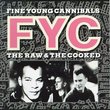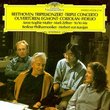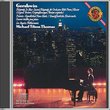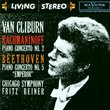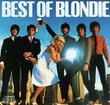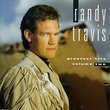| All Artists: Ludwig van Beethoven, David Zinman, Zurich Tonhalle Orchestra, Yefim Bronfman Title: Beethoven: Piano Concertos Nos. 1 & 2 Members Wishing: 0 Total Copies: 0 Label: Arte Nova Classics Original Release Date: 1/1/2007 Re-Release Date: 3/13/2007 Genre: Classical Styles: Forms & Genres, Concertos, Historical Periods, Classical (c.1770-1830), Instruments, Keyboard, Symphonies Number of Discs: 1 SwapaCD Credits: 1 UPC: 723721273958 |
Search - Ludwig van Beethoven, David Zinman, Zurich Tonhalle Orchestra :: Beethoven: Piano Concertos Nos. 1 & 2
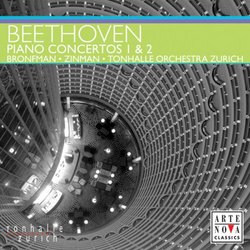 | Ludwig van Beethoven, David Zinman, Zurich Tonhalle Orchestra Beethoven: Piano Concertos Nos. 1 & 2 Genre: Classical
"I don't think I've ever heard Bronfman play better." - Gramophone Born in Tashkent, Uzbekistan in 1958, Yefim Bronfman immigrated to Israel at the age of thirteen and later to the US, where he pursued his training at t... more » |
Larger Image |
CD DetailsSynopsis
Album Description "I don't think I've ever heard Bronfman play better." - Gramophone Born in Tashkent, Uzbekistan in 1958, Yefim Bronfman immigrated to Israel at the age of thirteen and later to the US, where he pursued his training at the Juilliard School and the Marlboro and Curtis Institutes under Rudolf Serkin, Rudolf Firkusny, and Leon Fleisher. Bronfman celebrated his international debut in 1975, accompanied by the Montreal Symphony Orchestra under Zubin Mehta. He soon acquired an excellent reputation as a pianist on the stages of the world's major concert halls. Highlights of recent years include concerts with the Berlin Philharmonic, the Chicago Symphony, and the Cleveland Orchestra, the Staatskapelle Dresden, the Gewandhaus Orchestra Leipzig, the Concertgebouw Orchestra Amsterdam, and the Vienna Philharmonic. Yefim Bronfman also gives regular piano recitals in the leading concert halls of the US, Europe, and Asia. As a chamber musician, he has collaborated with the Emerson, Cleveland, Guarneri, and Juilliard Quartets. Other long-term musical partners include Emanuel Ax, Yo-Yo Ma, Joshua Bell, Lynn Harrell, Shlomo Mintz, and Pinchas Zukerman. Bronfman became an American citizen in 1989. Born in 1936, American conductor David Zinman has risen to the pinnacle of his career in the last decade. His discography of over one hundred recordings has won five Grammys and two Grands Prix du Disque. Founded in 1868, the Zurich Tonhalle Orchestra is Switzerland's oldest symphony orchestra. Similarly Requested CDs
|
CD ReviewsEarly Beethoven Concertos Beautifully Played Robin Friedman | Washington, D.C. United States | 07/03/2007 (5 out of 5 stars) "David Zinman conducting the Tonhalle Orchestra Zurich and pianist Yefim Bronfman have recently collaborated on a recording of Beethoven's five piano concertos and the triple concerto on the budget-priced Arte Nova label. In this recording of the first and second concertos, Zinman, his orchestra, and Bronfman are an ideal match. Zinman has become known for his period performances of Beethoven using modern instruments. His set of Beethoven symphonies has been highly acclaimed. His recording of Beethoven's Missa Solemnis has received mixed reviews, but I enjoyed it greatly. The performance of these concertos is crisp, articulate, boisterous, and ambitious. It brings out the drive, humor,originality and roughness-around-the-edges of early Beethoven. Yefim Bronfman is a powerhouse pianist. But he plays these early concertos idiomatically, lightly, smoothly, and with great flair. Of Beethoven's five concertos, the fourth and the fifth are mature middle-period works. The third concerto, in C minor, is something of a hybrid between Beethoven's early and middle styles while concertos 1 and 2 are works of the young Beethoven. Beethoven did not compose a late-period concerto, but these five works offer an excellent way of tracking Beethoven's development from his early years in Vienna to his period of maturity. More importantly, they contain unforgettable music. Beethoven composed the first two concertos for his own performance as a rising young composer in Vienna in his early to mid 20's. The earliest of his concertos is concerto no. 2 in B-flat major, opus 19. This work probably was written in some form before Beethoven moved to Vienna from Bonn at the age of 22. He revised and reworked it many times for his own use before publishing it at last in 1801. Beethoven described the work to his publisher as "A concerto for pianoforte, which, it is true, I do not make out to be one of my best. At the same time it would not disgrace you to engrave this concerto." The second remains the least-familiar of Beethoven's concertos. Particularly in its opening movement, the work has a bumptious, patchwork quality, probably due to Beethoven's many revisions of the score as well as to his youth. But the work has lovely movements, particularly in its lyrical second theme and in the delicate runs and movement of the piano part. The highlight of the work is the Adagio, a flowing and serious slow movement which builds dramatic tension in long solo passages for the piano towards the end. The finale of the second concerto is a boisterous rondo with a short, catchy and humorously syncopated theme. If Beethoven was correct in regarding the concerto as "not one of my best" he was also right that the work did not put him or his publisher to shame. The work, which owes a great deal to Mozart and Haydn, well rewards hearing. The piano concerto no. 1 in C major, opus 15 was composed in 1795 also primarily as a performance vehicle for Beethoven. This work is much more cohesive than the B-flat major concerto and was also published in 1801, several months after its companion. The opus 15 is a festive, high-spirited work, replete with tympani and trumpet as befitting an orchestral piece in C major. The opening movement features a range of themes, but it focuses on a march-like military phrase introduced at the outset by the orchestra and on a solo martial theme given to the piano. The piano part is full of filigree, long runs, trills and singing themes. Beethoven wrote a famously difficult cadenza for this early work. The largo, opens with a lyrical, reflective theme in the piano which is clung to and developed over the course of an extended movement, culminating in another floridly elaborate piano solo towards the end. The final rondo, which Beethoven is said to have composed in two days, is lively and rhythmical with some strongly accentuated dance themes as it proceeds. In this concerto, Beethoven comes into his own voice as a young composer while still building of the work of his great predecessors. Zinman and Bronfman offer a thoroughly enjoyable and idiomatic performance of early Beethoven. This is a lovely disc and at its low price offers an excellent way to get to know and love this music. Robin Friedman " Great on it's own, but don't buy the set. Lance Swanson | North Branch, MN USA | 02/18/2009 (5 out of 5 stars) "I had been looking for a matching set of the Beethoven concertos when I stumbled upon this series with Zinman/Bronfman. The price was right and I like Bronfman, so I invested in all of them. This disc is definitely the best of the set. The Zurich Tonhalle under Zinman set the perfect stage for Yefim Bronfman's performance or Concertos 1&2.
Bronfman's playing of these concertos is absolutely suited to the style of the era in which they were written. The light Classical period with just a hint of "Beethovenian attitude." The second copncerto in particular is the highlight of this disc for me. The constant motion and energy is nonstop. If you're like me and want a set though, go for the new EMI Triples release with Christian Zacharias/Hans Vonk. The price is comparable, if not better, and the performances are out of this world. " |

 Track Listings (6) - Disc #1
Track Listings (6) - Disc #1